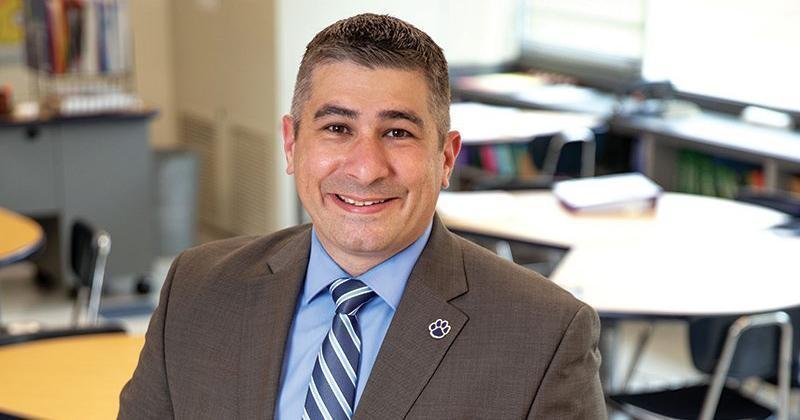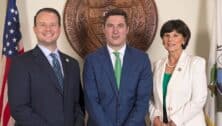Chester County Leadership: George Fiore

George Fiore, the Executive Director of the Chester County Intermediate Unit, the largest of Pennsylvania’s twenty-four Intermediate Units, spoke with VISTA Today about growing up in Brooklyn, the motivation behind his family’s move to Pennsylvania, how he knew that he was going to marry his wife when he met her as a teenager, and the strong impact she’s had on his life.
Fiore also discussed his journey in the field of education, as well as the opportunities, challenges, and priorities that lie ahead for the CCIU.
Where were you born, and where did you grow up?
I was born the oldest of three kids into a lower-middle-class family in Brooklyn, New York, and lived there until I was thirteen-years-old.
What did your parents do?
My dad worked his way up through a supermarket from the dairy manager to the store manager. He worked for the former Waldbaums and A&P supermarket stores.
My mom stayed at home with us until we were just old enough to be on our own and then took a job working as the bakery manager in the same supermarket chain as my father.
What brought your family to Pennsylvania?
My mom’s entire family were first-generation Italian immigrants. In the 1970s, two of her brothers moved from Brooklyn to Temple in Berks County to open an Italian restaurant. Our family would visit in the summer. Not only did I love the fresh air, but my parents wanted to move to Temple because it was safer, and there were more educational opportunities.
One night, when I was in ninth grade, I told my mom I saw a gun at lunch in school. That was the breaking point. She decided we were moving! That week, she drove us kids down to Pennsylvania to find a house. We bought a house a block from my grandparents and moved shortly after that.
My dad still worked in Brooklyn for two years after that and commuted to New York City every day.
Commuting to Brooklyn every day must have been tough for your father.
It was very tough. Until my father landed a job here in Pennsylvania, we kids had to be very independent. I took on the role of caring for my brother and sister while my parents worked, getting them ready for school and such. We kids became very close in those years.
Do you ever go back to Brooklyn to visit?
I still have uncles, aunts, and cousins who live there, so I go back to visit them. I love the food from Brooklyn – a slice of pizza, sausage, deli meats. Brooklyn’s food scene is so authentic and homemade.
Did you play any sports when you were growing up?
I played football and baseball. My best memories are playing legion baseball with my friends in the regional tournaments. We did reasonably well, and many of the guys I played with on those legion teams are still my friends today. My own kids are amazed that I’m still friends with those guys from high school.
What was your first job growing up?
I worked for my uncle’s restaurant, beginning when I was ten years old. I did not have much choice as the family restaurant was right around the block! I worked the register, bussed tables, made pizza, and pretty much every other job you could have there.
If you want a tough work experience, work for your family. I was not going out on a Friday night because I had to work. I also couldn’t call out sick because my uncle would call my mom to confirm I was indeed ill.
Outside of working in the family restaurant, what other jobs did you have?
When I was in college, I got a job working for the Liquor Control Board. My girlfriend then, who I married, was the “girl next door.” She worked as a bank teller, and one of the Liquor Control Store Managers asked her if she knew anyone who would want to work in the stores. It was a great job for me. I was working at the pizzeria, and at the LCB, so I was doing very well.
What did you do for the State Store?
We called it “catching” boxes off the truck. There would be huge tractor-trailers delivering boxes full of liquor. The truck driver would push the boxes down the roller ramp, and I would catch them at the end. They were very heavy, so I’m glad I was in good shape.
The expectation in my house was you needed to work, make money, and set up a career. My dad would always say, “you can’t stay in the basement.”
You were a hard-working kid?
There are 24 hours in a day, and when my eyes are open, I want those hours to be as productive as possible.
When did that drive to be so productive first surface?
When I met my wife when I was sixteen or seventeen years-old. I knew when I met her that I was going to marry her. Knowing her gave me a bigger purpose.
What kind of music were you listening to back then?
Because I grew up in New York, I listened to a lot of hip hop back then. I also liked rock music. Now, I listen to mostly country, but I liked the hip hop scene back then.
Where did you go to college?
I was a pretty good student. I probably could have worked a little harder. When I met my wife, my grades went from average B to straight A’s. She truly changed my trajectory in life.
When I was thinking about what colleges to go to, it was all new to parents because they had not gone to college. I had a teacher who said I would be a great social studies teacher. I applied to a lot of schools and got into a lot of schools. I thought about going back to the city and attending NYU, but my dad said, “George, you’re going to have to carry the debt of whatever school you choose.”
I ended up going to Kutztown University and did very well there.
Looking back, was Kutztown a good choice for you?
It was a fantastic choice. For what I wanted to do, be an educator, Kutztown was a great fit for me. I learned that every student has to find their match. Your match isn’t just the college experience. Instead, I would advocate for the bigger match – helping each student figure out what he or she wants to do with their life? It doesn’t make sense to put yourself in thousands of dollars in debt just because you want to go to a particular university and have a college experience.
Who were the people George, who gave you your big breaks?
After college, I was surrounded by excellent leaders. When I graduated from Kutztown, I interviewed to be a social studies teacher – government, world cultures, in the Wilson School District outside of Reading. During the interview, the principal, a guy named Gerry Slemmer, asked me what I wanted to be in five or ten years. I replied, ‘I’d love to do your job!’ Gerry laughed and said he wouldn’t wish that on anyone! Not only did Gerry hire me, but he would bring me in like a coach to talk about leadership and to ask my advice. Those conversations with Gerry gave me opportunities to lead and grow.
Five years into the job, Larry Mussoline became the superintendent of Wilson School District. Larry came into my classroom one day, watched me teach a few minutes, and told me that I would be a superintendent one day. He asked me to apply for an open position to be the district’s director of instructional technology.
What do you think Larry saw in you?
I think he saw my drive. He would always say to me that great leaders had certain traits – high task orientation and high interpersonal relations were two of the most important, which he saw I had. I was young and didn’t have those skills wholly refined. I took a lot of lumps along the way and learned a lot of lessons.
Who else helped you along the way?
When I eventually became a superintendent of the Kutztown Area School District, I worked with a fantastic school board. I had such great leadership on that board, people who had been there for decades and really invested. We worked together as a team, and they taught me so much about priorities. Our number one priority was always the kids. It also didn’t hurt that I didn’t raise taxes for three years! I knew if I needed to get the finances, they would be there for me and exhaust all options.
You’re a month into your new assignment at CCIU, what are your opportunities, challenges, and priorities ahead?
The most important thing for me now is to get to know the organization, the people we serve, and the CCIU staff. I’m on a listen and learn tour. It’s a complex organization with a lot of services provided to a diverse group of people. We have a lot of talented individuals working at the organizations. The CCIU is not a place that needs to be micromanaged.
Besides getting out and meeting with groups like the Economic Development Council Board and other community groups, I’m diving heavy into three areas. The first is identifying how to best serve the twelve school districts in Chester County with their wide range of needs.
The second is making sure we are staying ahead of initiatives, mandates, and legislation, and supporting our schools through these avenues.
Finally, my third priority is CCIU’s business side. The CCIU does not function as a school district. We provide services all over the state of Pennsylvania and into New Jersey. We not only provide services for the schools but also run driver education and nursing programs for post-high school and adult learners.
I want to keep Chester County thriving. My job is to drive workforce and economic development! Whatever I can do to accelerate it, I’m going to explore. Whether it’s the twelve school districts or creating programs for special education services.
Our technical high schools in Chester County are some of the best in the state. We run some great programs, have the right people running them, and I want to keep growing them.
What do you do in your free time, George?
I stay very busy, but I do like to spend time with my wife and three kids. I have a five-year-old who plays flag football and t-ball, which I coach.
My ten year-old-daughter is a basketball and soccer player, and I love watching her play.
My oldest son is twelve, and he plays water polo, lacrosse, and is a swimmer. They’re very athletic.
I love to golf with my friends. Spending time with my family and friends makes me happy.
Finally, George, what is the best piece of advice you’ve ever received?
My dad always said, “no matter what you do, you always need to treat people well.”
He said they won’t always be happy with the decisions you make, but you have to treat them well and honor them. He always said I’d be a good man if I did that. He wanted me to apply that to not only my job but also my family.
He had that pay-it-forward mentality – if you’re nice to someone, they’ll be kind to someone else. He got that from his parents, who were part of the greatest generation. They lived by the belief that if you went to work, worked hard, treat people well, and give back, you’ll live a full life.
_______
Publisher’s Note: Laura Wagoner contributed to this profile.
Connect With Your Community
Subscribe to stay informed!
"*" indicates required fields














































![95000-1023_ACJ_BannerAd[1]](https://vista.today/wp-content/uploads/2023/03/95000-1023_ACJ_BannerAd1.jpg)





